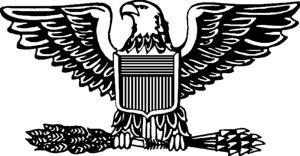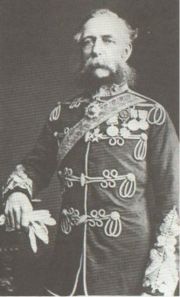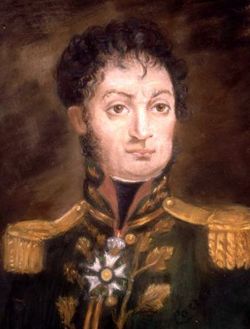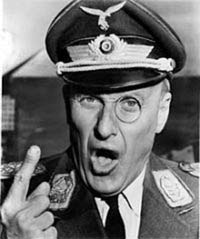Colonel
A colonel is a military officer, ranking somewhere between a subaltern and a field marshal. Colonels have various important duties, though no one knows what they are. Privates generally peel potatoes; sergeants yell at people, majors do the same except louder and with large moustaches; generals make speeches in front of enormous flags and captains narrow their eyes purposefully while scanning the coast for any sign of Bonaparte's ships. But colonels? No one knows.
Colonels around the world
British colonels
British colonels are rather gung-ho aristocrats with fantastic muttonchops. Most have only one thought in mind, and that is victory. Some have a second thought, that being cooling gin-based beverages. Some lack even that first thought, and go into battle with nothing in their heads but a vague intuition of military tactics, which they communicate via grunts and clicks.
The British colonel feels no fear, especially no fear of British casualties. One British corpse, they say, is the equal of any two greasy foreign corpses. Attempts to prove this led to some of the most memorable massacres of the nineteenth century, such as the Charge of the Light Brigade, the Assault on Death Mountain, and the legendary Trans-Atlantic March, in which fifteen regiments drowned trying to catch the Tuareg hordes in a pincer movement.[1]
Famous British colonels
Colonel Sir Wilfred Fitzpimlico As aide-de-camp to the Duke of Wellington, Fitzpimlico led the famous "I say, look here" charge at the Battle of Talavera. After a French bullet struck the cup of tea he was drinking, the irritated colonel led a cavalry charge right into the heart of enemy forces in order to find the culprit and give him a good stern talking to. Most of his column was wiped out by French artillery, but the colonel eventually succeeded in wringing a mumbled apology from Pvt. Pierre du Pree.
Colonel Lord Whisting A famous infantry commander, Whisting played a critical role in the Battle of the Barren Wasteland during the Third Pygmy War. Realising that the pygmies were expecting attack from the west, the Colonel decided to attack from the east. This was totally unexpected, as an attack from the east could only be carried out by means of a forced march through the area known as Scorpion and Crocodile Valley (with Lions). Losing roughly 99% of his troops in Scorpion and Crocodile Valley (with Lions), the Colonel arrived alone at the pygmy encampment. The astonished pygmies decided to make Colonel Whisting their new god. Taking advantage of their trust, the Colonel killed them all with smallpox infected bullets.
Colonel Sir Humphrey St. John Taradiddle-Whimsy Taradiddle-Whimsy gained a commission to command The Queen's Own Sherwood Labourers in 1843, as the result of a large cheque. He became known for the astounding amount of casualties sustained by his troops during training (He famously declared "I don't want the soft ones who can't take a bullet between the eyes!"), which reduced his command to one soldier, Pvt. Harry "Ironface" Fletcher. During the Crimean War, Taradiddle-Whimsy was given the command of the Medium Brigade (known as "The Old Mediocrities"), and it was here that he became responsible for the little-known Charge of the Medium Brigade. At the Battle of Balaclava, Taradiddle-Whimsy was observing the mindless carnage of the Charge of the Light Brigade. As the doomed men charged the Russian guns, Taradiddle-Whimsy declared "That blighter Raglan's going to decimate the whole brigade! I can do better than that!" and immediately gave the order for the entire Medium Brigade to charge a Russian cliff-face. None survived, and Taradiddle-Whimsy returned home a hero.
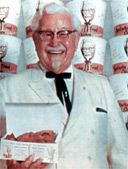
American colonels
It is a little known fact that, due to a clause in the surrender terms that Grant offered to Lee at Appomattox, all American colonels must be from the south. When not in uniform, they must wear white suits, and all of them are required by law to sport a goatee.
American colonels love to duel. They hate northerners, negroes, communists, capitalists, foreigners, Mexicans, Demmycrats, Republicans, Dixiecrats, Dixiepublicans, Canadians, women, and each other. Their hot southern blood is frequently at the boiling point, and they can calm down only with distractions such as mint juleps and chicken.
Famous American colonels
Colonel Bob Marker "Colonel Bob" had a distinguished career in the military before becoming manager to 1950s singing sensations Buddy Holly, the Big Bopper and Richie Valens. His mint-julep fueled decision to place his clients on a plane with Jimi Hendrix, Mama Cass, Janis Joplin and John Lennon, load that plane with drugs, ham sandwiches, lone nut gunmen and snakes, and then crash said plane into Brian Jones's swimming pool has been severely criticized. The deaths of all these rock stars at once was immortalized by Don McLean in his hit song Colonel Bob Marker is a Fucktard.
Colonel Fugate Another distinguished colonel, Fugate made his fortune with his chain of Colonel Fugate's Southern Fried Roadkill restaurants. Advertised as "finger lickin' barely edible", the unpleasant taste of his food was part of his marketing strategy. Patrons upset and disgusted by the taste of their meals would tend to buy the "XXXX-tra Large Colonel's Moonshine" to wash the food from their mouth. And their memories.
French colonels
French colonels are somewhat more secure in their masculinity than these other colonels. As such, they fear not wearing wigs and stockings, or going into battle in some delightful little taffeta number.
During the early nineteenth century, many French colonels were notoriously sadistic, and loved nothing more than standing around posing while some plucky British hero was tortured for information. Boo hiss! Many more, however, remained traditionally French by surrendering or fleeing at the first sign of enemy resistance. However, by World War I they had adopted much of the British model, and loved nothing more than sipping an aperitif while hundreds of their own troops were blown to smithereens by the German artillery.
Famous French colonels
Colonel Maurice Escravet de Pompeu-Villmarchet As the principal nemesis for the mysterious and deadly hero known only as the Purple Fop, Pompeu-Villmarchet sought the Fop here, there, in Heaven and in Hell. The colonel tried his hardest to get his hands on the Fop, who was much too slippery, and would often escape by disguising himself as a washerwoman, a pantomime horse or Napoleon. Over the years, the colonel's failure broke his fragile spirit. In the early days, whenever he caught the Fop he'd raise a glass and gloatingly declare "We meet again, monsieur. Only, this time, the advantage is mine." Towards the end of his career, he'd just say "We meet again. Now I'll turn my back, close my eyes and count to one hundred."
Colonel Pierre de la Vertfarie et Pernod Commander of the 3rd Chasseurs de la Panache, the most beautifully uniformed troops in all of Gascony. At the outbreak of the World War I, he famously proclaimed that the war would be over "by the Feast of St. Hoieua"[2] because "German uniforms are so last year." Invalided home from the war after breaking a nail, he spent the rest of his life writing books purporting to prove that the French had won the war on points by 1915, rendering the remaining three years of conflict pointless.
Colonel le Priq A fine example of that rarest of subgroups within the French Colonels, namely the French Foreign Legion Colonels. The French send their meanest, toughest colonels to the Foreign Legion, mainly to keep them from bullying the other colonels. It's like time out in the desert. Colonel le Priq was the toughest, meanest French colonel ever, and was famous for punishing his men for the slightest infraction. Breaking wind at the dinner table could get you buried up to your neck in sand, while swimming in an oasis without a regulation rubber duck could lead to three months duty vacuuming the desert. Colonel le Priq is famous for telling his legionnaires "Life is as brief as a butterfly's fart, but death is eternal. You will walk until you fall, then you will crawl. When you can crawl no longer, you will be shot."
German colonels
Before becoming a colonel in the German army, a prospective candidate must be injured in one eye, in order to necessitate the wearing of a monocle.
German colonels are either twisted sadists who delight in persecuting Jews, Gypsies, and electricians or else amusing bumbling incompetents who let Allied POWs perform countless acts of sabotage against the German military. Like all colonels, German colonels like a drink, enjoying small glasses of cold schnapps. Failing that, they enjoy various liquors looted from other countries, but only after stopping to boast about it.[3]
Famous German colonels
Colonel Horst von Redenbacher Visionary commander during the Franco-Prussian war of 1870. von Redenbacher was one of the first military leaders to foresee the potential of air-based weapons. As such, he built a gigantic airship with which to bomb Paris. The airship was loaded with high explosive bombs, and carried Richard Wagner and the Bayreuth Opera Company, who stood on top of the airship playing Ride of the Valkyries during the final bombing run. Though damage was minimal, the French were concerned about the muffled quality of the music, and so built the Eiffel Tower in order to get a better vantage point for the next time.
Colonel Christoph Dunst Commandant of Stalag L-0L, the elite POW camp where the Reich kept its wackiest prisoners. Colonel Dunst had the unenviable task of keeping these fun-loving freedom fighters in line, a duty made all the more difficult by his own status as an amusing social and ethnic stereotype. Dunst was further handicapped by poor quality troops, such as Sgt. Hypothyroidal; and by the leader of the prisoners, an American colonel, Col. Cyrus P. Beauregard. After three years of failure at keeping a lid on the wacky antics of Beauregard and his men, Dunst eventually decided to have them all shot. Tried for crimes against the Geneva Convention after the war, the Colonel pleaded guilty, but was given a light sentence on the grounds of extreme provocation. In the end, he was given a three years suspended sentence, and a restraining order preventing him from joining the officer corps of any fascist army until 1956.
Russian colonels
Russian colonels (Polkovnik in Russian, literally meaning Gold-Shouldered Glory-Boys) are field officers, above the rank of Lowly Peasant Soldier, but just below Obese Capitalistic General. They require constant supplies of vodka to function efficiently, otherwise they become angry and incomprehensible. In emergency circumstances during World War II, Russian colonels were known to survive on captured German schnapps, but this is not recommended as it tends to shorten the lifespan of the colonel and may void its warranty.
Famous Russian colonels
Colonel Dolopov Yogot Commanding officer of the 122nd Roller-Skate Guards during the critical Battle for Strategically Unimportant Hill 213 in 1943. Having bravely drunk a gallon of vodka while dancing to the tune of "I May Be Russian, But I Can Still Count To Three" and being ordered to attack, he fearlessly hid behind a table and ordered his three remaining roller-skate guardsmen to encircle the German Sixth Army. When they refused, he shot them in the back and rode to safety on the back of a nearby peasant with great devotion to duty. For this glorious act of defence of the Motherland, he was ordered the Order of No Real Merit, Second Class and had a peasant named after him in his home town of Vodkagrad.
Colonel Orumov Colonel of the 6th Guards, he was appointed to the post of Acting Bond Villain during Operation Goldeneye, the undercover British invasion of Russia in 1995 by the 1st James Bond Fusiliers. He was ordered to act like a competent, reasonably villainous staff officer during the filming of the invasion, in order to fool the enemy intelligence. He was noticeably sober throughout the invasion and never once makes reference to the "detested capitalists" of Britain, but he did have an amusing name and unrealistic accent and so his mission was deemed a success by the Soviet Ultra-rich and Covered In Medals Supreme Military Council. He was duly promoted to Senior Bumbling Staff Officer, but his promising career was cut short tragically in 1999 when he was run over by a traction engine and eaten by peasants.
Conclusion
As you can see, by and large colonels aren't very nice, and should probably be avoided at all costs. If you see one, try to distract him with alcohol, and then run.
See also
Notes
- ↑ The other side of the pincer was tunnelling its way from New Zealand.
- ↑ Pronounced "Saint Hwaao-egh". This fifteenth-century holy man is the patron saint of lower back pain.
- ↑ e.g.
"Would you care for a glass of Polish vodka? I brought a case back from the massacre of Vrklgnmspt."
"Hm, not bad. Almost as good as die Amerikaner "Tears of the Innocent".
